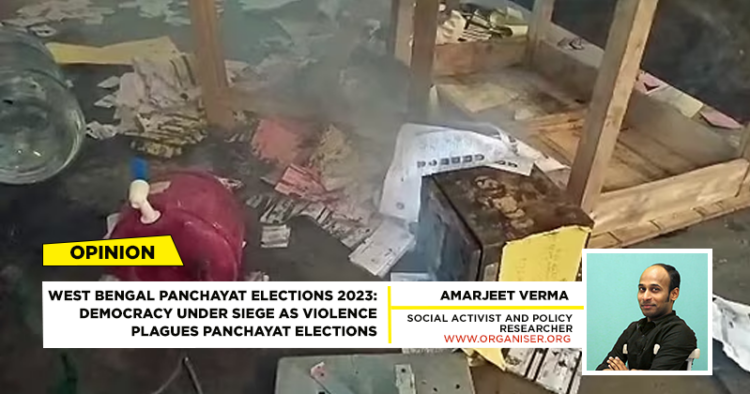The fresh events surrounding the West Bengal State Election Commission’s handling of sensitive polling stations and the subsequent violence during the West Bengal Panchayat elections have once again brought to light a disturbing trend. This trend of violence, especially around the elections, and serious damage to the lives of opposition parties in West Bengal is deeply disturbing, and it is imperative that such acts that undermine the foundations of democracy must be condemned unequivocally. The visuals that have come out of the panchayat elections in West Bengal are so terrifying; it completely exposes the harsh reality and threatens the very foundations of our democratic principles.
According to a senior Border Security Force (BSF) official, the West Bengal State Election Commission has failed to provide crucial information about sensitive polling stations to central security forces despite repeated requests. On June 7, 2023, the BSF was finally informed about the numbers of such booths, but they were not given their locations or any other important details. This lack of cooperation severely limited the ability of the security forces to ensure a free and fair electoral process. Moreover, it was revealed that the BSF deployment was at the behest of the local administration rather than being adequately deployed in sensitive polling stations as required. This raises serious questions about the impartiality and commitment of the state government to protect the democratic rights of its citizens.
The decision of the West Bengal State Election Commission to declare resistance in 696 booths spread over 19 districts further underlines the seriousness of the situation. While it is commendable that corrective measures are being taken, the fact remains that this re-election was necessitated by irregularities and violence during the first vote. The inability of the state to effectively address these issues in the first place raises doubts about the sincerity of its commitment to ensuring a fair democratic process. Tragically, the violence that took place during the West Bengal Panchayat elections resulted in loss of life and injuries. Reports of booths being captured, ballot boxes damaged and attacks on presiding officers from various districts paint a grim picture of the deteriorating law and order situation in West Bengal. This is not an isolated incident but rather part of a recurring pattern of violence witnessed after the State Assembly Elections when members of the opposition party were forced to flee for their lives. These repeated attacks create an atmosphere of fear and intimidation and prevent the opposition from freely participating in the electoral process. The state machinery seems to be effectively paralyzed and serves the interests of a select few rather than upholding the principles of justice and fairness. The ongoing political vendettas associated with incidents of violence during the ongoing panchayat elections reflect the state government’s complicity in these acts.
Having a robust electoral commission that acts independently, free from political pressures and upholds the principles of fairness and transparency is key to a thriving democracy. Allegations of state-machinery-sponsored violence and failure to ensure the safety of voters and election officials are undermining the state’s democratic foundations. It is imperative that these allegations are thoroughly investigated, and those found guilty must be held accountable. It is disheartening to note that the Mamata Banerjee-led West Bengal government has a history of post-election violence. The state machinery appears to be paralyzed in the hands of those who seek to use it for political vendettas and suppression of the opposition. The famous slogan “Khela Hobe”, once synonymous with the spirit of sportsmanship, has now taken a dark turn. It has become a symbol of violence and a pretext for targeting political opponents. This disturbing trend not only threatens the lives and liberties of individuals but also undermines the principles of a healthy democratic system. It is surprising that the self-proclaimed guardians of democracy and advocates of free speech, the liberal community, have chosen to maintain a disturbingly profound silence on this grave matter. Their inability to even consider performing the simple fact-checking they so eagerly apply to trivial matters or those that align with their agenda is a clear betrayal of their principles.
It is crucial for the citizens of West Bengal and the nation as a whole to rise above party lines and demand accountability from those in power. Democracy is built on the pillars of justice, inclusiveness and respect for the rule of law. Any attempts to subvert these principles strike at the heart of our nation’s democratic fabric. The West Bengal State Election Commission must take immediate and effective measures to ensure the safety of voters and the integrity of the election process. Transparent communication, unbiased deployment of security forces and strict action against those responsible for violence are essential steps to restore public confidence.
In addition, it is imperative that the Government of India and other concerned authorities play an active role in ensuring the protection of democratic values in West Bengal. Promoting the principles of democracy is not just a political issue but a responsibility that transcends party lines. These fresh events of violence during the Panchayat Elections in West Bengal should serve as a wake-up call for all democratic societies. The erosion of democratic values and the rise of violence during democratic practices can have far-reaching consequences for a nation’s stability and progress. It is our duty to stand up to such abuses and work to protect the democratic ideals that form the foundation of our society. The people of West Bengal deserve a government that upholds the principles of democracy and protects the rights of all citizens regardless of their political affiliation. It is high time we demand an end to the politics of violence and ensure that every voter’s voice is respected and heard.


















Comments